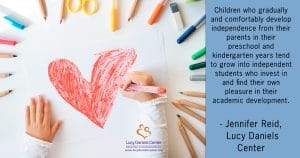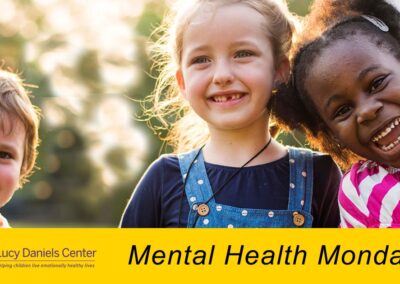“Do your best!” Many of us probably heard some variation of these words of encouragement when we were growing up, especially when it came to schoolwork. Of course, parents want their children to do their best in school, but finding the most helpful ways to encourage academic investment depends on the individual needs of each child. In some cases, a child’s difficulty with academic tasks stems from emotional struggles and words of encouragement are simply not enough. In today’s post, we will look at some of the aspects of early emotional development that support later academic success.
What makes a “good” student?
Some children are able to make use of statements such as “do your best” to pull themselves together and produce their best work, while others are left helplessly struggling with their schoolwork. Many of the attributes of “good” students begin to form long before children enter kindergarten. They develop over time and continue to take shape over the course of a child’s school career. Good students are comfortable with their independence, are able and willing to tackle and solve problems, can manage and tolerate feelings of frustration when solutions are not immediately found, and are intrinsically motivated and invested in their learning.
The roots of academic success in early childhood
Children who gradually and comfortably develop independence from their parents in their preschool and kindergarten years tend to grow into independent students who invest in and find their own pleasure in their academic development. As children become more independent in early childhood, they learn to work through various feelings in their play and social interactions as well as in their development of self-care skills (such as cleaning up or getting dressed). As simple as it may seem, a young child’s ability to comfortably play independently or cope with the frustration of a zipper (and stick with the task – despite repeated failures – until it zips) can be indicators of how well he or she will adjust to the demands of being an independent student.
What can parents of young children do?
Parents can support their child’s emotional development and his/her emerging sense of autonomy by paying attention to the emotional tasks and challenges in early childhood. Admiration (and praise) that is specific to the emotional task at hand (persisting despite frustration with the zipper) rather than focusing on the actual task (zipping), is one way to esteem the development of qualities of a good student. “I’m impressed with how you didn’t give up on that tricky zipper!” has a more lasting effect, for example, than a simple, “Good job!” Furthermore, watch for signs of emotional difficulties in a variety of settings. Is your five-year-old comfortable with playing independently, or does he turn to you every time he encounters a challenging situation? How independent is your child in her preschool setting? Does she give up easily or does she persist through challenging tasks?
For parents of school-aged children
If words of encouragement don’t seem to be cutting it, the underlying emotional reasons for difficulties in school may need to be addressed. Looking beyond the surface to find the roots of school-related difficulties will help you determine just what type of help will be most effective. Has there been a sudden change in investment in schoolwork or have there been struggles for some time? If you are able to pinpoint a more recent environmental cause, such as a move or the birth of a sibling, simply talking openly about the apparent causes can be helpful. However, in some cases, the struggles may stem from a longstanding emotional pattern. When you reflect on your child’s earlier years, was he comfortable persisting with that zipper, or did he often turn to you when faced with a challenge? In such cases, the emotional roots of the difficulties may make it hard for the usual types of encouragement to be enough. Parents can work on this with their children by addressing the emotional issues in a broader way as they manifest in areas outside of school. While this can sometimes be achieved with extra effort from parents, qualified education or mental health professionals can often provide help to parents and children when words of encouragement are not enough.



